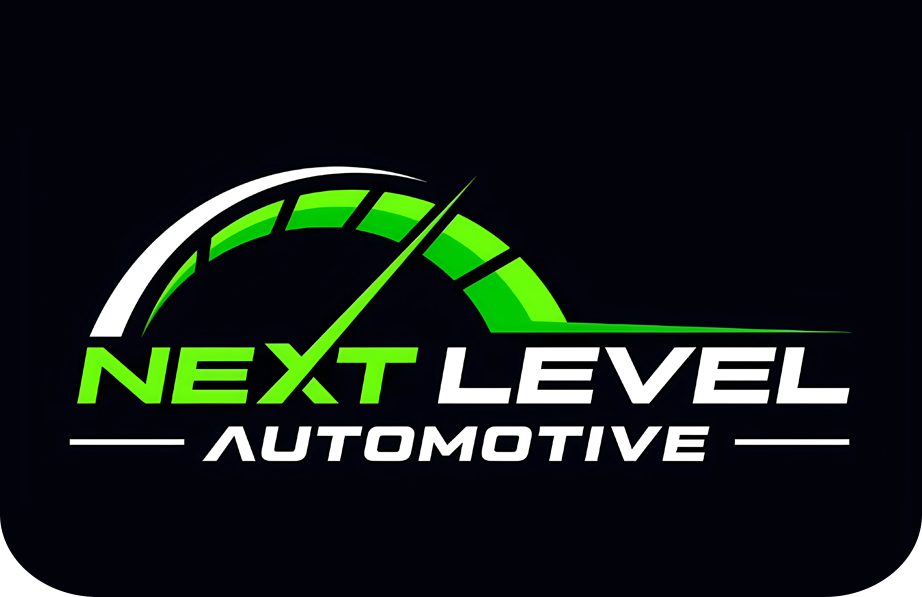FAQs
Next Level Automotive
Have an auto maintenance related question? At Next Level Automotive, we have the answers. Check out these FAQs and call or text us today for more information!
How often should I get an oil change?
Generally, it's recommended to change your oil every 3,000 to 7,000 miles or every three months. However, your vehicle's owner's manual provides specific guidance for your make and model. Many modern vehicles are equipped with systems that notify you when service is due. Regular oil changes are crucial as oil lubricates the engine's internal components. Without proper maintenance, oil can degrade into sludge, potentially causing significant engine issues.How often should I change my air filter?
Vehicles typically have two air filters: one for the engine and one for the cabin. A clogged filter can restrict airflow, impacting engine performance and air quality. While the standard recommendation is to replace filters around every 30,000 miles, the best practice is to inspect them regularly. The frequency of replacement can vary based on driving conditions. Fortunately, filter replacement is usually a quick and straightforward process.When should I replace my brake pads?
Brake pads typically require replacement between 20,000 and 30,000 miles, though this can vary depending on driving habits and conditions. It's important to be aware of signs indicating worn brake pads, such as increased stopping distance or unusual noises when braking. If you notice these symptoms, it's advisable to have your brakes inspected promptly. Delaying brake pad replacement can lead to rotor damage, resulting in more extensive and costly repairs.When should I replace my car battery?
Car batteries typically last between three to five years, but environmental factors like extreme temperatures can affect their lifespan. It's important to monitor for signs of battery deterioration, such as dimming lights or difficulty starting the vehicle. If you notice these symptoms, it may be time to consider a battery replacement to ensure reliable vehicle operation.When should I get a tire rotation?
Tire rotation is recommended approximately every six months or 6,000 to 8,000 miles. This maintenance task is particularly important for vehicles with two-wheel drive or those frequently used in off-road conditions, as these factors can lead to uneven tire wear. Regular rotations help ensure even wear across all tires, potentially extending their lifespan and maintaining optimal vehicle performance.How much air pressure should I put into my tires?
The correct tire pressure varies depending on your vehicle and tire type. This information can typically be found on the driver's side door jamb, in the owner's manual, or on the tire sidewall. Maintaining proper tire pressure is crucial for vehicle handling and safety. Overinflation can lead to handling difficulties, while underinflation may result in blowouts. For specific guidance, our automotive experts can provide recommendations based on your vehicle's specifications.What should I do if my check engine light comes on?
When the check engine light illuminates, it can indicate a range of issues from minor concerns like a loose gas cap to more serious problems. To ensure your safety and prevent potential damage, we recommend bringing your vehicle to our shop for a comprehensive diagnostic check. Our technicians can identify the issue and provide you with detailed information, allowing you to make an informed decision about necessary repairs or maintenance.What type of oil do I need?
The type of oil your vehicle requires can be found in your owner's manual. Generally, vehicles use either synthetic or conventional oil. It's important to note that conventional oil typically requires more frequent changes compared to synthetic oil. Understanding the specific oil requirements for your vehicle is essential for maintaining optimal engine performance and longevity.Why should I have my belts and hoses replaced?
Under normal driving conditions, belts and hoses typically don't require replacement before 60,000 miles. However, regular inspection and timely replacement of worn components can prevent unexpected breakdowns and potential damage to other engine parts. Properly functioning belts and hoses are crucial for maintaining normal operation of belt-driven components and preventing issues such as engine overheating.Why should I have my cooling system flushed?
Regular cooling system flushes are important for maintaining your vehicle's health. Most manufacturers recommend annual flushes for regularly driven vehicles. Over time, coolant can degrade and become corrosive, potentially damaging gaskets and seals. By flushing the system before contamination occurs, you can avoid costly repairs and ensure your cooling system functions efficiently.
Learn More About
Next Level Automotive
Located in Columbia, TN. Next Level Automotive specializes in auto maintenance services and brake repair services. 3-year, 36,000-mile warranty. ASE-certified. Give us a call today!
Business Hours
- Mon - Fri
- -
- Sat - Sun
- Closed
Saturdays By Appointment Only
Hi. Do you need any help?
Privacy Policy
| Do Not Share My Information
| Conditions of Use
| Notice and Take Down Policy
| Website Accessibility Policy
© 2025
The content on this website is owned by us and our licensors. Do not copy any content (including images) without our consent.


Share On: